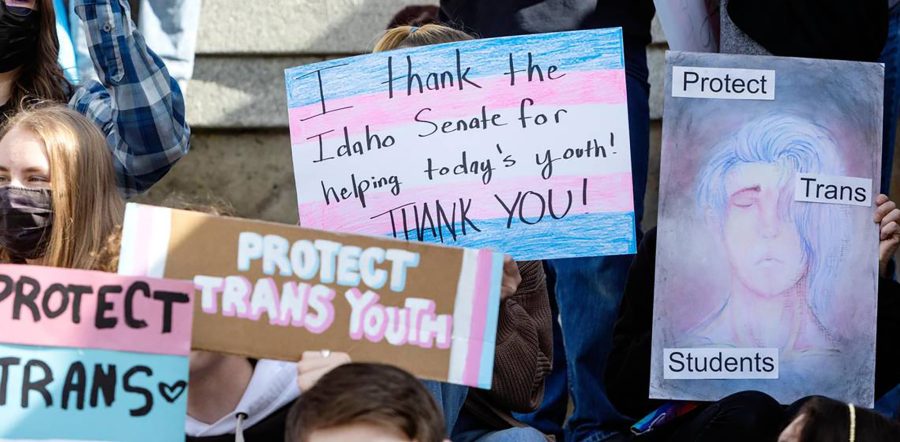Tribune News Service
Transgender people and allies of trans youth hold signs at the Idaho Capitol at a celebration rally after the Senate killed a 2022 bill criminalizing gender-affirming care. The Idaho House voted Tuesday, Feb. 14, 2023, to make providing this kind of care to children a felony. Photo permission from Sarah A. Miller/Idaho Statesman/TNS.
Florida medical board places limitations on gender-affirming healthcare for minors
Florida’s Board of Medicine and Board of Osteopathic Medicine have further passed rules restricting access to gender-affirming healthcare for minors. This decision comes after the passing of several bills limiting rights based on gender and sexual identity. The boards approved the ruling on March 16 and March 28 respectively.
According to the World Health Organization, gender-affirming healthcare includes a broad category of social, psychological, behavioral, and medical interventions “designed to support and affirm an individual’s gender identity” when that identity differs from the gender to which they were born. These resources aid in supporting transgender people with integrating emotional, interpersonal and biological components of their lives with their gender identity.
The rulings prevent healthcare professionals in Florida from supplying patients under the age of 18 with any form of gender-affirming care, including cross-sex hormone therapy, puberty blockers and surgical procedures that “alter primary or secondary sexual characteristics.” The exception to this was for minors who had already been receiving treatment before the ruling went into effect.
Many transgender students at Marjory Stoneman Douglas High School have expressed a strongly negative opinion toward this bill, citing its detrimental impacts on their mental health.
“I think the bill is harmful to transgender youth because it takes away a vital part of their identity and prevents people from getting the care that they need,” sophomore Violet Greenstein, who is transgender, said. “This can affect a person’s mental health; since without this type of healthcare, individuals could feel stripped of their identity leading to problems like depression and other mental disorders. It’s disappointing that the state is focusing on this rather than larger issues.”
A major criticism of these new rulings is the potential harmful effects for minors who identify as part of the LGBTQ+ community.
“LGBTQ advocates and many physicians regard gender-affirming care as medically necessary, evidence-based care that uses a multidisciplinary approach to help a person transition from their assigned gender – the one the person was designated at birth – to their affirmed gender, the gender by which one wants to be known,” a CNN article by Devan Cole said. “Major medical associations agree that gender-affirming care is clinically appropriate for children and adults with gender dysphoria.”
While many students at MSD show opposition to the bill, some feel there is reason to limit gender-affirming care up to a certain age.
“Although I support people who identify as the gender opposite to which they were born to, I believe that there should be an age at which they can be restricted to transition medically,” sophomore Sophie Kusuma said.
In addition to the rulings, DeSantis signed Senate Bill 254 into law on May 17. This bill further intensifies the decisions of the boards and includes more restrictions. These consist of suspending licenses of medical workers who provide gender-affirming healthcare to minors and permit state courts jurisdiction over children who received any type of gender-affirming care. This would allow judicial powers to take emergency custody of minors who were subject to procedures such as hormone therapy or sex-reassignment surgery.
“Children under the age of 12 are just then beginning to mature, so them being able to take life-altering drugs can be detrimental to their health,” Kusuma said. “In retrospect, the bill also pertains to all legally minor peoples, and I personally believe that those mentally mature enough should have the right to decide what they would like to do to their bodies.”
Throughout Gov. Ron DeSantis’ term in office, multiple laws have been passed which restrict the rights of LGBTQ+ individuals across the state. Among the most controversial includes House Bill 1557, also known as the “Don’t Say Gay” bill, which prohibits discussions regarding sexual orientation and gender identity in grades K-3. The governor also signed a bill banning trans women from playing on women’s sports teams in 2021.
“All of these bills go against basic human rights, which is why I don’t support them,” freshman Turner Oosterhuis said. “Everyone should be able to do what they want with themselves and their bodies.”
Although the decision made by the medical boards has been met with much criticism and negative feedback, it is likely that additional legislation will be passed in the near future. These restrictions will continue to restrict the accessibility of resources and healthcare options to LGBTQ+ youth. As the rulings become stricter throughout the state, the effects could potentially place further pressure on adolescents across Florida.
